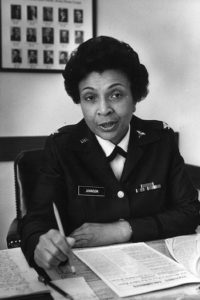
Hazel Johnson Brown (1979)
*Hazel Johnson-Brown was born on this date in 1927. She was a Black nurse and the first Black woman General in the United States Army.
Born in West Chester, Pa., Hazel Winifred Johnson was one of seven children. She always wanted to be a nurse, but racial prejudice created major obstacles. She was rejected when she applied to study at the local hospital after high school. The Johnson family’s white woman nurse saw the young Hazel’s potential and helped her gain admission to the Harlem Hospital School of Nursing, where she earned her nursing diploma in 1950. Johnson enlisted in the Army in 1955, seven years after President Harry S. Truman ordered the desegregation of the military. She took assignments across the country and in Asia, rising in the ranks as she impressed her superiors with her skill in the operating room.
In addition to her degree from the Harlem Hospital School of Nursing, she earned a bachelor’s degree in nursing from Villanova University in 1959, a master’s degree from Columbia University’s Teachers College in 1963, and a doctorate in educational administration from Catholic University in 1978. She served in Japan soon after enlisting. In the 1960s, she trained surgical nurses on their way to Vietnam. Her military decorations included the Distinguished Service Medal, the Legion of Merit, the Meritorious Service Medal, and the Army Commendation Medal.
She was twice named Army Nurse of the Year. In the 1970s, she was the Walter Reed Army Institute of Nursing director. She served as the chief nurse of the Army hospital in Seoul when she made military history in 1979, when she was promoted to brigadier general and, simultaneously, to the command of the 7,000 nurses in the Army Nurse Corps. She was the first Black woman to hold both posts. “Race is an incidence of birth,” Gen. Johnson-Brown said at the time of her promotion. “I hope the criterion for selection didn’t include race but competence.”
After her Army retirement, Gen. Johnson-Brown headed the American Nurses Association’s government relations unit and directed George Mason University’s Center for Health Policy. Her marriage to David Brown ended in divorce. In the interview with National Public Radio, Gen. Johnson-Brown said that she was not a “quiet dissenter” regarding the slights she suffered as a Black woman, in uniform and out. She recalled going with her mother to a hot dog stand in Philadelphia. Several times, the waitress walked past them to serve white customers first. When the waitress finally delivered their order, Gen. Johnson-Brown turned it away. “Now you eat it,” she told the waitress. To her mother, she said, “Let’s go.”
Hazel Johnson-Brown, 83, the first Black woman to become an Army general and a former chief of the Army Nurse Corps, died Aug. 5, 2011, en route to a hospital near her home in Wilmington, Del. She had Alzheimer’s disease.
The Associated Press permissions
450 W. 33rd St.,
New York, NY 10001.